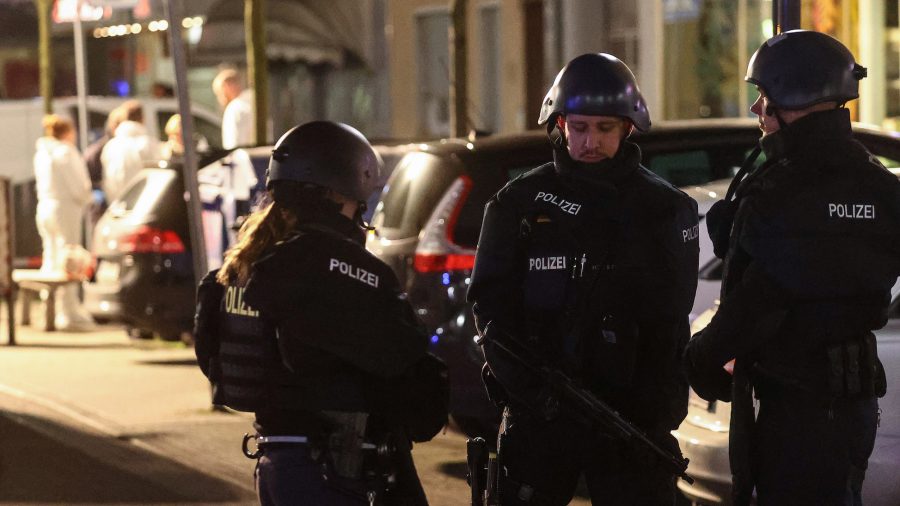
A man suspected of shooting dead nine people across two shisha bars in a German town on Thursday had posted a manifesto online including conspiracy theories and deeply racist views that envisioned complete extermination of people from a number of countries—including Bangladesh.
The manifesto envisioned first a “rough cleaning” and then a “fine cleaning” that could halve the world’s population, prosecutors said on Thursday, reports Time.
Prosecutor General Peter Frank identified the gunman only as Tobias R. (43)—in line with German privacy laws—and confirmed he had posted extremist videos and a manifesto with “confused ideas and far-fetched conspiracy theories” on his website.
“On the suspected perpetrator’s home page, he had put up video messages and a kind of manifesto that, in addition to obscure thoughts and absurd conspiracy theories, pointed to deeply racist views,” Frank said.
The man identified himself as Tobias Rathjen on the website, which has since been taken down but had a mailing address matching that of the home where the bodies of the killer and his mother were found.
In the manifesto, Rathjen claimed to have approached police several times with conspiracy theories.
Among the documents posted to the website was a 24-page, rambling manifesto in German detailing, among other things, fears that he has been under government surveillance for years. He blamed the surveillance for his inability to have a relationship with a woman.
“We now have ethnic groups, races or cultures in our midst that are destructive in every respect,” he wrote.
“The following people must be completely exterminated: Morocco, Algeria, Tunisia, Libya, Egypt, Israel, Syria, Jordan, Lebanon, the complete Arabian Peninsula, Turkey, Iraq, Iran, Kazakhstan, Turkmenistan, Usbekistan, India, Pakistan, Afghanistan, Bangladesh, Vietnam, Laos, Cambodia and the Philippines,” he also wrote, according to the Time report.
German Chancellor Angela Merkel condemned the “poison” of racism. Her deputy, Olaf Scholz, took to Twitter to say: “Politically, nobody can deny that 75 years after Nazi dictatorship, there is real terror again.”
On Thursday, the gunman burst into a bar in downtown Hanau and opened fire on the patrons, then drove to a second bar where he continued the attack, police and witnesses said.
Officers chased a car leaving the scene of the second and final attack to another address, where they found the bodies of the suspect and his 72-year-old mother, both with gunshot wounds, police said.
Frank told reporters the nine people shot dead had immigrant backgrounds. His office later said they included German citizens and foreigners aged between 21 and 44. Six more people were injured in the attack.

At least five of the victims were Turkish nationals, Ankara’s ambassador to Berlin told state broadcaster TRT Haber, as his government demanded robust action, Reuters reported.
The Confederation of the Communities of Kurdistan in Germany said several victims were Kurdish and accused Germany’s political leaders of “not resolutely opposing right-wing networks and right-wing terrorism”.
Germany is home to three million people of Turkish origin, including one million ethnic Kurds.
Bulgarian public broadcaster BNT said a 32-year-old Bulgarian man was among the victims.
Investigators said it appeared the gunman acted alone, but Frank said authorities are trying to find out whether there were others who knew of or supported the attack. He added that his office is looking into any contacts the killer may have had inside Germany and abroad.
Following the shooting incident, Germany faced calls to toughen gun ownership laws and step up efforts to track far-right sympathisers.
The suspect belonged to a gun club, raising questions as to how a man with such ideological convictions managed to gain membership and obtain the weapons he used, Reuters reported.
Federal Prosecutor General Peter Frank said on Friday that the suspect had a licence for two weapons, and it remained unclear whether he had contacts with other far-right sympathisers at home or abroad.
Frank added that the gunman had sent a letter to prosecutors in November complaining about an unknown intelligence agency with powers to control people’s thoughts and actions.
“The letter did not include his racist calls for the extermination of certain peoples,” Frank told a news conference. “We did not launch an investigation based on the letter, which later appeared in the gunman’s racist manifesto.”
In October last year, Chancellor Angela Merkel’s government outlawed the sale of guns to members of extremist groups monitored by security agencies and obliged online platforms to inform police about hate speech.
Those measures followed the killing of a pro-immigration German politician in June and an attack on a synagogue and a kebab shop four months later in Halle by an anti-Semitic gunman who livestreamed his actions.

